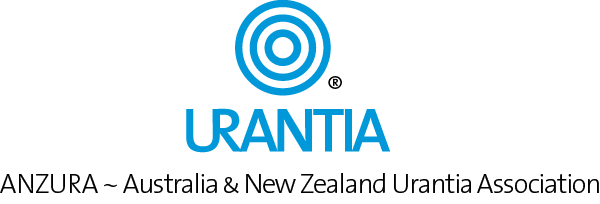A Reflection on ‘Insensitive’ Words in The Urantia Book
(Presented at the October 2020 online ANZURA conference)
 The focus of this article is on language – and specifically on what I am calling ‘insensitive’ language. This labelling is, by definition, subjective and words that might offend one person do not have the same effect on another. This subjectivity is part of what I want to explore in this article. I was motivated to prepare this article by observing my reaction in a study group a few months ago to particular words, when I realised that these words were triggering a somewhat emotional and negative response in me, and I found myself querying the other people in the group, about what exactly these words meant in today’s world. To my surprise, I found that I was the only person having this response.
The focus of this article is on language – and specifically on what I am calling ‘insensitive’ language. This labelling is, by definition, subjective and words that might offend one person do not have the same effect on another. This subjectivity is part of what I want to explore in this article. I was motivated to prepare this article by observing my reaction in a study group a few months ago to particular words, when I realised that these words were triggering a somewhat emotional and negative response in me, and I found myself querying the other people in the group, about what exactly these words meant in today’s world. To my surprise, I found that I was the only person having this response.
This set me to thinking about other words in The Urantia Book that triggered a similar response in me, why I felt they were inappropriate in modern society, why my fellow readers did not have the same response, and what that might mean to those of us who were keen on sharing the ideas in The Urantia Book with others.
Basic Communication Theory
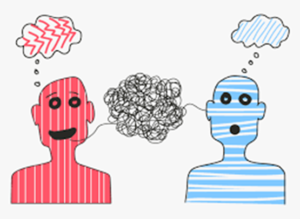 This image expresses the key aspects of communication. Person A has a thought/idea that s/he wants to share with Person B. The thought must be encoded into language and then passed over to Person B who hopefully will end up with an accurate idea of what Person A was trying to communicate. Experts in the field of communication frequently refer to the fact that “communication is rarely completely understood” (Barnett & O’Rourke, 2011, p. 32).
This image expresses the key aspects of communication. Person A has a thought/idea that s/he wants to share with Person B. The thought must be encoded into language and then passed over to Person B who hopefully will end up with an accurate idea of what Person A was trying to communicate. Experts in the field of communication frequently refer to the fact that “communication is rarely completely understood” (Barnett & O’Rourke, 2011, p. 32).
This is explained as follows:
Words cannot carry thoughts and feelings, because these occur inside people. We can only try to encode these into words, but we will each have developed our own unique meanings for all words through our own experiences. (Barnett & O’Rourke, 201, p. 33).
This aspect of communication to me is one of the most challenging – that each person has their own understanding of what words mean, which has been influenced by things they have experienced in their lives, and, most importantly, they do not realise that other people have a different understanding. It is not hard to see how this easily leads to miscommunication and misunderstandings.
The Changing Nature of Language
Not only are there individual interpretations of words, in the wider group/society, general meanings also change. Words change their meanings over time. For example, the word ‘awful’ used to mean ‘full of awe” – as in ‘the awful majesty of God’. The word ‘computer’ used to mean a person who did a lot of calculations. The word ‘fantastic’ used to mean something only in the imagination.
Words can also fall out of fashion, and fall into disuse, either because what they refer to becomes less common, or changing values and practices makes the words less acceptable. Words that refer to different racial groups, for example, or words such as ‘apothecary’, for chemist, or ‘bedlam’ for a mental hospital.
Language Trends Today
The move towards using more sensitive and non-discriminatory language began some decades ago and is ongoing. Sensitive language is defined as “language free of implied judgements based on race or ethnicity, gender, disability, sexual orientation or age.” (Language Matters, 2013).
From my perspective, it began with gender. I can recall when I was a trainee teacher in the late 1970s, that there was a focus on replacing ‘Man’ with “the human race” to refer to all people. The stylistic challenge of always writing ‘he or she’ to be gender inclusive has led to the current situation where it is grammatically acceptable to use ‘they’ as a neutral singular pronoun, in the absence of such a word in the English language.
This focus on using more sensitive language is continuing. An article on the Internet in August 2020 had the headline: “IBM, Microsoft staff rally to remove racially insensitive language from products. These efforts follow similar actions taken by Twitter, Git Hub, the Linus kernel, MySQL, and Open BSD team” (Cimpanu, 2020). An African American woman who was doing coding for Microsoft really struggled with the words “master” and “slave” in the coding language, because it just reminded her of her terrible family history. Microsoft have replaced “master-slave” with “primary-secondary”, and “whitelist” and “blacklist” with “allowlist” and “denylist”.
I would note though that these trends are mainly evident in professional and public contexts, in businesses who do not want to inadvertently offend their customers both current and potential, and public service contexts, particularly education and health.
Context Matters
The context matters in regard to what words are acceptable to use. When people are communicating with others in well-defined and familiar contexts, it does not present a problem, as generally they will know what words may or may not cause offence or harm to others in this familiar circle, and they do not have to choose their words carefully.
It is when people are communicating with people they do not know, that issues can arise. It is impossible to predict which words might upset someone, if nothing is known about their background or their experiences in life. However, some things should be fairly obvious even in this kind of situation, such as gender, ethnic background, nationality and perhaps profession.
Paradigm Shift in Society Regarding Eugenics
At the time when the Urantia papers were being received, in the 1920s to 1950s, eugenics was very popular in certain circles of US society, and consequently words related to eugenics were used frequently. William and Lena Sadler were strongly supportive of eugenics goals and often spoke about them at conferences (Oliva, 2013). Eugenics was also supported by some in New Zealand at a similar time. The Mental Defectives Amendment Act in 1928 included a number of these words, such as “feeble-minded, the “unfit”, “degenerates”, “imbecile children” and those with “mental defects” (Harvie, 2018).
Modern society has a very different view of eugenics post World War II and a very different view of the kind of people who were described by these terms.
In the Education sector, in particular, there has been significant change. In New Zealand, what are now called “special needs” children were integrated into mainstream schools in the 1980s and 1990s, and the special schools they previously attended were closed. Teacher training/education since then has focused strongly on ensuring that these children are not discriminated against, so inclusive and sensitive language has become the norm. Most teachers would recoil at the use of words that previously were quite common, such as “handicapped” or “crippled”.
In the Health sector, a similar approach to the use of sensitive and non-discriminatory language prevails, perhaps even more so, particularly because of the diversity of the population in New Zealand. Additionally, and quite crucially, if patients feel discriminated against by the use of particular words, then they will refuse treatment, which generally does not have a good outcome.
Sample of “Insensitive” Words in The Urantia Book
Research into some of these words can reveal the drop in use over the past few decades. Patterns of use can be shown by generating an Ngram – this is a software tool developed by Google to track the usage of a word over time. Google has extremely large databases of texts both written and spoken, and the Ngram software tracks how often words are used at different time periods.
Word 1: “feeble-minded”
Definition: lacking the normal mental powers. Medicine/Medical. (no longer in technical use) mentally deficient, stupid or foolish; not sensible: feeble–minded remarks. (www.dictionary.com) [5 mentions in The Urantia Book]
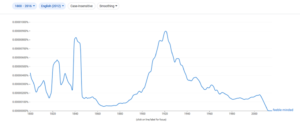
As this Ngram shows, ‘feeble-minded’ was used a lot in the 1920s, but then started decreasing and pretty much disappeared from use around 2005.
Word 2: “defective”
Definition: (from Google):
- imperfect or faulty. 2. dated offensive – having mental disabilities. [17 mentions in The Urantia Book]
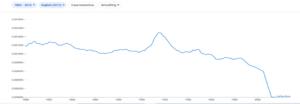
There is a slightly different pattern of use for this word, as it is used to describe machinery, as well as people, and thus took longer to become the apparently obsolete word it is today.
Word 3: “degenerate”
Definition: an immoral or corrupt person. (Google) [14 mentions in The Urantia Book]
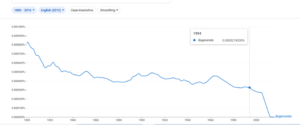
As a noun, this word refers to an immoral person. As a verb it is still used in technology and health e.g. “her condition degenerated”.
Modern Perspectives on These Words
- “feeble-minded”. A quick consultation with my 25-year old daughter about this word came up with the response: ‘we just don’t say this anymore”. This of course does not mean that there are not people with intellectual disabilities, but current knowledge of the wide range of cognitive disorders is much more advanced, and terminology is more precise.
- “defective”. Today this covers a wide range of very different disabilities, physical and intellectual, and this term is simply not used.
- “degenerate”. This referred to immoral behaviour, and there are very different moral standards today compared with the early part of the 20th Century. Again, the word has become obsolete in this meaning.
Possible effect on Urantia Book Outreach
When Urantia Book readers introduce the book and interact with new readers, they are often asked questions about these and other words that they find offensive. This is a common occurrence and has been dealt with many times by writers of articles in Urantia Book journals and presenters at conferences. I have quite a lengthy text on “Race and The Urantia Book”, and recently came across a YouTube video in which the speaker strongly condemned The Urantia Book as being a ‘racist eugenics’ book.
It can be challenging to explain some of the more contentious concepts, particularly when words such as those described above, and others, have caused someone to feel offended and hurt.
One approach could be to highlight the timeframe of the book, and to stress that it uses words and thinking acceptable at the time, but that there have been many changes in society 70 years on. In some ways The Urantia Book can be seen as an historical text, and perhaps not ‘judged’ from a modern perspective.
In terms of the use of insensitive language, the book has this to say, from Paper 81, Development of Modern Civilization:
Effectiveness of language. …Live and growing languages insure the expansion of civilised thinking and planning…Today there is great need for further linguistic development to facilitate the expression of evolving thought. [Paper 81:6.16, page 908.5]
I would add that the increase in the use of inclusive and non-discriminatory language are also improving the way differently abled people are viewed and treated. Jesus demonstrated his perspective on this in the cleansing of the Temple, as described below:
As Jesus was about to begin his address, two things happened to arrest his attention. At the money table of a near-by exchanger a violent and heated argument had arisen over the alleged overcharging of a Jew from Alexandria, while at the same moment the air was rent by the bellowing of a drove of some one hundred bullocks which was being driven from one section of the animal pens to another. As Jesus paused, silently but thoughtfully contemplating this scene of commerce and confusion, close by he beheld a simple-minded Galilean, a man he had once talked with in Iron, being ridiculed and jostled about by supercilious and would-be superior Judeans; and all of this combined to produce one of those strange and periodic uprisings of indignant emotion in the soul of Jesus. [Paper 173:1.6. page 1890.1 emphasis added).
In the end, communication is mostly between individuals, and I feel that here we simply need to pay heed to what Jesus felt when he observed how this person was treated, and make sure to treat every person, no matter what their level of ableness, as a spiritual sister or brother, and choose our words with care so that we do not cause any harm.
References
Barnett, S. & O’Rourke, s. (2011). Communication, Organisation and Innovation (3rd Edn.). Pearson New Zealand.
Cimpanu, C. (2020, August). IBM, Microsoft staff rally to remove racially insensitive language from products. ZDNet. https://www.zdnet.com/article/ibm-microsoft-staff-rally-to-remove-racially-insensitive-language-from-products/
Harvie, W. (2018). Flashback: NZ almost legalises eugenic sterilisation. Stuff. https://www.stuff.co.nz/national/101587899/flashback-nz-almost-legalises-eugenic-sterilisation
Language Matters: The Importance of Sensitivity in Writing: Part 1. (2013). https://en-author-services.edanz.com/blogs/language-matters-importance-sensitivity-writing-part-1
Oliva, Sioux (2013). The Sadlers and Eugenics. http://legacyhistory.com/blog/the-sadlers-and-eugenics

